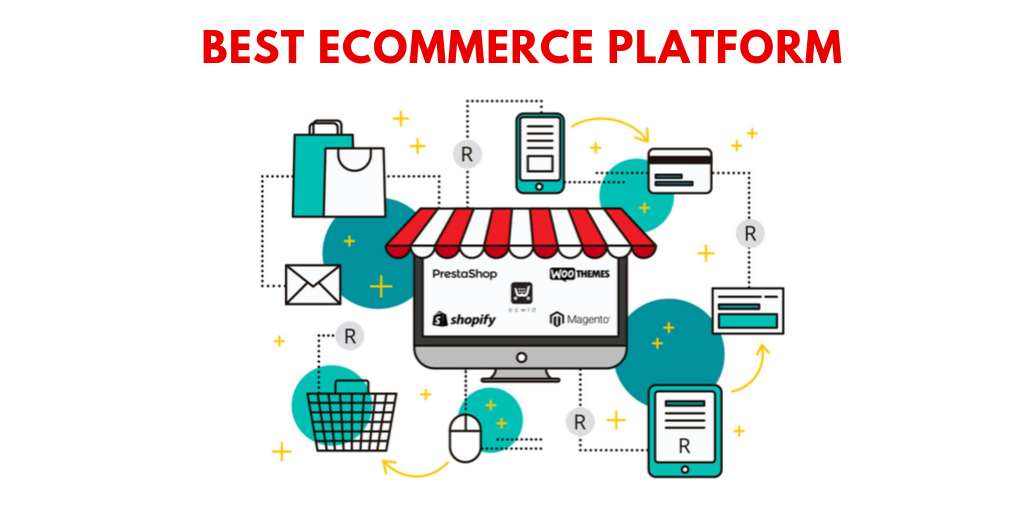Isn’t it so frustrating to find the right eCommerce platform to start your business?
Choosing the right eCommerce platforms for your business is the first and most important step, and we understand that there can be a lot of pressure. Even though those platforms are free, it’d be time-consuming.
Ready to find out which is suitable for your business and even more time if you choose the wrong one and have to start again.
But what a surprise! BSS Commerce has already done the hard work of researching the best open source eCommerce platforms for you.
Check out this list below.
I. Most Recommended Open Source eCommerce Platforms.
Table of Contents
1. Magento eCommerce platform.
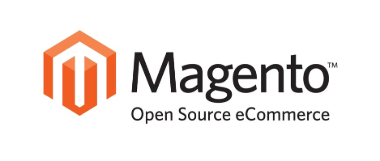
Check Magento Download now.
Magento Community Edition is undoubtedly one of the most recommended free platforms for your eCommerce system. It has a huge number of customers, which could be counted as up to 300,000 users, and many active communities around the globe.
Magento has two versions: the Community Edition (Open source) and the Enterprise Edition (Premium). They all have an overwhelming amount of features as well as free & paid extensions for you to choose from.
Pros
- Lots of features.
- Multi-vendor support.
- Easy customization.
- Active community.
- Numerous extensions.
- Full control over the website.
Cons
- Required programming knowledge.
- No official customer support.
Our review of Magento eCommerce platform
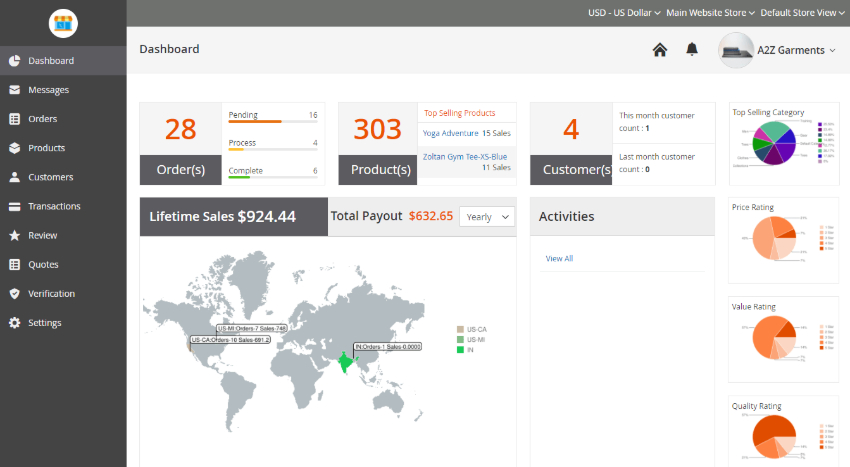
Let’s be honest, Magento is one of the best open source eCommerce platforms as it offers quite a huge amount of features, ranging from product customization to wishlist checkout and many more. It’s not only flexible but also very powerful in terms of its structure.
If you have experience with WordPress, then Magento is likely to be the best choice for you since its interface is quite similar. This free platform also supports multi-store management since its target consumers are enterprises and multi-countries vendors. It’s also optimized for SEO.
However, as the free version is open source, you most likely wouldn’t receive any support from the official Magento company.
Truth be told, Magento is not made for an entry-level eCommerce business, as it requires lots of effort to optimize it efficiently. Still, if you have a budget and manage to hire developers to take care of the website, you should be able to use the platform without trouble.
It could easily be the most appreciated eCommerce platform you have ever wished for, even better than Shopify!
2. OpenCart.

OpenCart is widely used for eCommerce businesses with over 600,000 websites, and 0.83% of them appeared on the top list of 1 million sites from Alexa.
Compared to other best open source eCommerce platforms, Opencart focuses on personalization solutions based on default core features.
If you dreamed of an open-source eCommerce platform that has decent features to has no need for add-ons, then OpenCart is absolutely perfect for you.
Pros
- Lightweight.
- Solid features.
- Low-cost setup.
Cons
- Limited customization.
- Bugs & crashes if updating.
Our review of OpenCart eCommerce platform

This platform is lightweight, quick-setup, and low-cost, which is the reason it’s popular with small businesses and local stores since it only takes a few clicks to set up your own business.
Unfortunately, OpenCart’s custom programming is quite limited compared to Magento or Drupal Commerce.
Since it is easy for newcomers to use, customization options are also fewer, which made OpenCart one of those e-commerce free platforms that programmers would prefer to avoid.
If you are a mid-level and enterprise-level business and you’re looking for a fitting solution to fully control the website, then OpenCart is definitely not for you.
Similar to Zen Cart, any updates to OpenCart could cause unexpected crashes. Vulnerabilities can arise since not all custom websites are suitable.
3. Drupal Commerce.

Drupal Commerce is an open-source eCommerce platform created by an old UberCart employee, which made it quite the cousin of UberCart with some similar abilities and functions.
Nevertheless, Drupal Commerce is much more complicated compared to UberCart. Drupal Commerce is based on CMS, and it could be integrated by a huge number of third-party add-ons that provide countless eCommerce solutions.
Not to mention Drupal is the closest competitor of WordPress. Besides eCommerce, Drupal could also be used to create numerous types of websites.
Pros
- User-friendly design.
- Rich functions.
- Tailored for developers.
Cons
- Expensive setup.
- Pricey customer support.
Our review of Drupal eCommerce platform
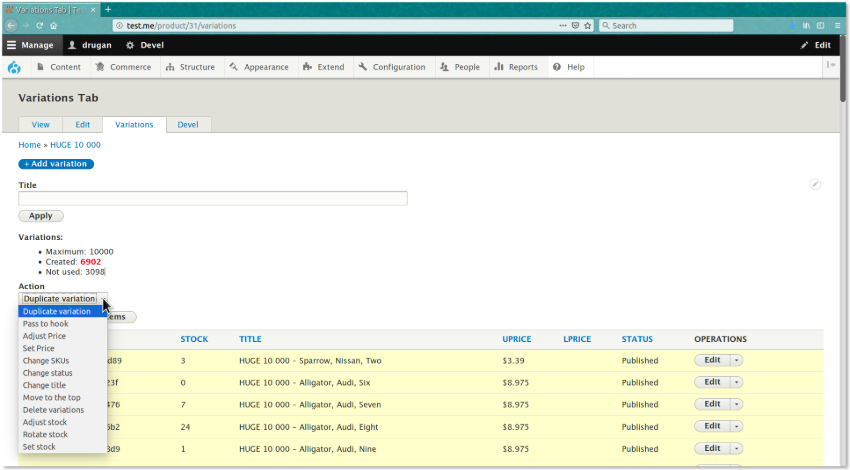
Drupal did an excellent job of creating one of the best open source eCommerce platforms that’s tailored for developers and enterprise-level companies.
Drupal Commerce has a huge variety of add-ons and extensions, not to mention other basic features that were integrated into its core. It has built-in security and many active communities that are willing to help you solve your troubles.
However, it’s not without flaws. Drupal Commerce is truly expensive since its favored customers are from enterprises. Small and mid-level businesses would find no place among their customer’ base.
It’s also to mention that customer support for Drupal Commerce charges you quite an amount of expenses.
CHECK OUT Magento vs Drupal Comparison to make the right decision.
4. PrestaShop eCommerce platform.
.

PrestaShop is a fairly lightweight and low-cost eCommerce platform that has over 250,000 businesses that are using it right now.
Surprisingly, the PrestaShop community has over 850,000 users, which is considered to be quite a handful of help for newcomers.
Pros
- Lightweight platform.
- Easy customization.
- Interactive interfaces.
- Friendly design.
- Decent extensions.
- Support custom coding.
Cons
- Low scale.
- Expensive extensions.
- Expensive monthly costs.
Our review of PrestaShop

PrestaShop surprises us with its lightweight and compact characteristics. It’s also to mention that this open-source eCommerce platform has quite a number of extensions and themes.
This platform has a friendly design that is suited to beginners, which makes it a great Shopify alternative.
Somehow, PrestaShop still has its limitations.
It isn’t as robust as Magento, and it doesn’t have enough scalability. If required, you can use custom coding to turn your site into the same as those large global store websites. Yet, the most ideal website for this platform is for small and medium-sized companies.
It also isn’t mandatory to download any additional modules, but it seems more often than not that you will have to pay for an extension that isn’t inexpensive.
COMPARE Magento vs PrestaShop: Who wins?
5. WordPress WooCommerce.

Basically, WordPress is not an eCommerce platform but a blogging one. However, with the help of the WooCommerce plug-in, it’s to say WordPress itself has turned into quite an open-source eCommerce platform that is highly recommended for small and mid-size businesses.
Unlike Magento, Shopify, and OpenCart are only made for eCommerce, WordPress WooCommerce can be used for multiple purposes, such as implementing both product categories and blog sections in your site at once without the help of developers.
Pros
- Cheap setup.
- Easy to customize.
- Lots of add-ons.
- User-friendly interface.
Cons
- Resource-hungry.
- Costly per month.
Our review of WordPress WooCommerce eCommerce platform

To sum up, WooCommerce is an incredible addition that fleshes out WordPress’s potential of being an open-source eCommerce platform.
It gives you full control of the product pages, categories, and many more, which seems so close to the professional level of other eCommerce platforms like Magento or OpenCart.
Yet, it still has many flaws that could be improved with the help of professional developers, which came from the original nature of WordPress, such as the slow site speed or weak security.
BREAK DOWN Magento vs WooCommerce Competition to select the right platform for your business.
6. CubeCart eCommerce platform.
.
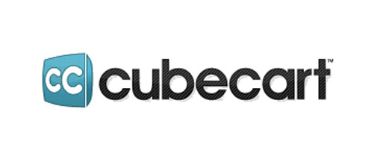
If you are looking for an open-source eCommerce solution that is user-friendly for small businesses and new eCommerce stores, then CubeCart can easily be your recommendation, as it offers a large number of plug-ins and likable customer support. It’s proven by 10,000 users around the globe.
Just to remind you, CubeCart isn’t the scale of Shopify or any big eCommerce platform just yet, so they don’t enable phone support. On behalf of that, you could get live support and such on the site.
Pros
- Simple features.
- Lots of add-ons.
- Great customer support.
Cons
- Hard to custom coding.
Our review of CubeCart eCommerce platform
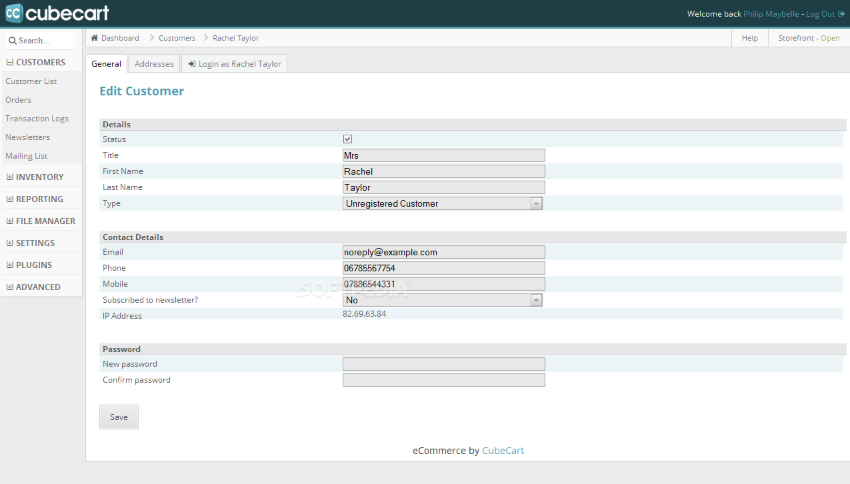
CubeCart is an ideal option for small and mid-size businesses. It’s especially fit for store owners who are looking for a cheap open-source eCommerce platform that is rich in features.
However, it’s to be noted that CubeCart is a terrible choice for any enterprise-level business since its development potential is hindered by its simple design and limited choices, which are only meant for small businesses.
Wrapping up, CubeCart is somehow similar to WordPress WooCommerce but much easier to understand and use to its maximum limit.
I recommend you to use CubeCart if your business is still an entry-level eCommerce website.
7. Ubercart eCommerce platform.
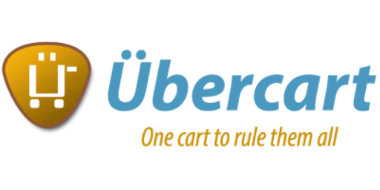
It’s said that UberCart is the original version of Drupal Commerce, with much more straightforward and uncomplicated options in the backend. There’s a neverending debate about which one is better Drupal and Ubercart.
Usually, Ubercart stays at the bottom of any top eCommerce platform due to its simplistic design as well as limited functions compared to others.
Pros
- Simple design.
- User-friendly functions.
- Cheap setup.
Cons
- Limited customization.
- Only basic features.
Our review of UberCart eCommerce platform
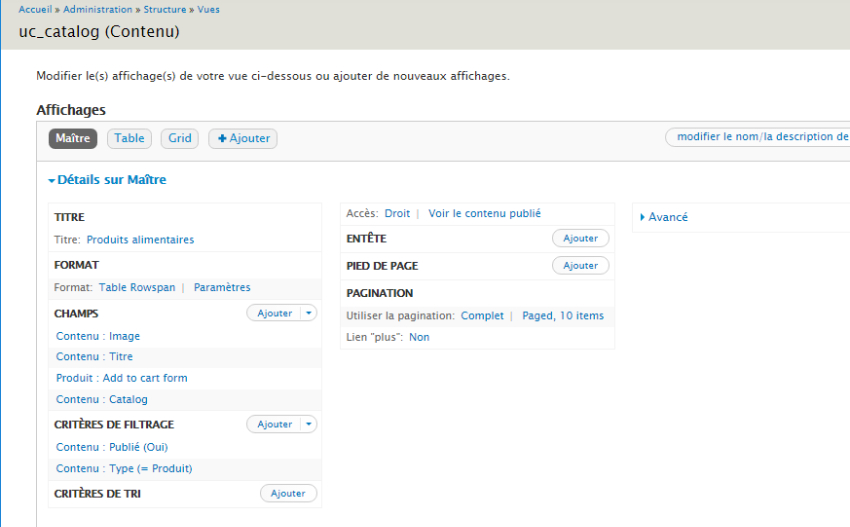
As its Drupal origins, UberCart could be considered as a basic open-source eCommerce platform with simple features including shopping carts, product pages, attributes & categories…
It’s a waste that UberCart doesn’t have many functions, and if you want anything new for your business, you ought to buy them in the form of extensions.
Overall, I feel like Ubercart is better for less experienced users. It even hinders your design options, theme, and CSS, to the least.
8. Zen Cart.

Zen Cart is created for small business models such as stores or entrepreneur businesses, especially aimed at people without knowledge of website development.
Among all these recommended eCommerce platforms and website builders, Zen Cart is the most user-friendly free platform. If you don’t have the required technical knowledge, Zen Cart is worth looking into.
Pros
- Newbie-friendly functions.
- Supportive community.
- Tailored for developers.
Cons
- Technical errors.
- Unoptimized for SEO.
Our review of Zen Cart
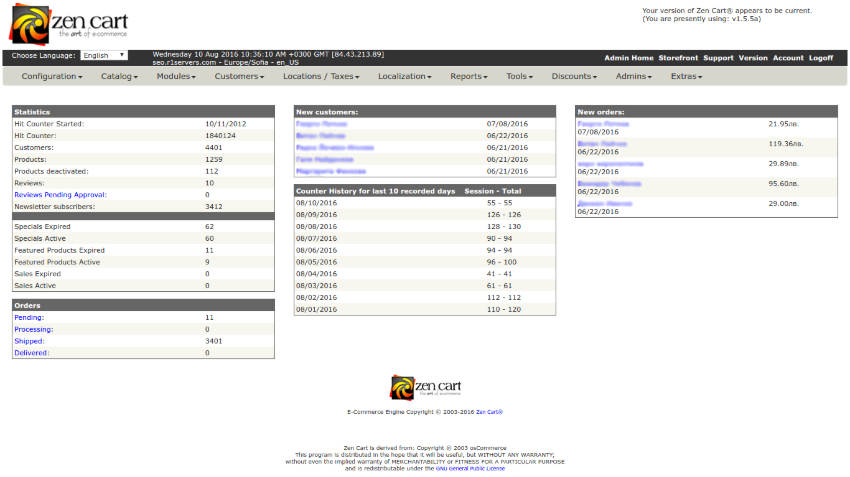
Compared to other open-source eCommerce platforms, Zen Cart surprises us with over 1800 add-ons and an active community of 150,000 members that are willing to help to provide solutions for your problem.
Moreover, Zen Cart has wide-ranging features and customization options that you could easily find suitable for your store.
On the other hand, Zen Cart still has some minor problems, mostly with technical codes such as updating errors and SEO optimization.
9. VirtueMart.

VirtueMart has a collection of more than 500 apps, shops worldwide, and a committed and involved developer community for use with Joomla 2.5 and 3.
The free open-source eCommerce platform has over 350,000 subscribers, but only about 1,000 of them are clustered in the top 1 million high-quality websites.
VirtueMart is located in the USA and Russia, in the large majority of eCommerce websites. In contrast, there are only 3-5 programmers working directly on this, which is why VirtueMart’s core platform is that small in scale.
Pros
- Full controls & customization.
- Huge active community.
Cons
- Not user-friendly for newbies.
- Add-ons are essentials.
- No support.
Our review of VirtueMart
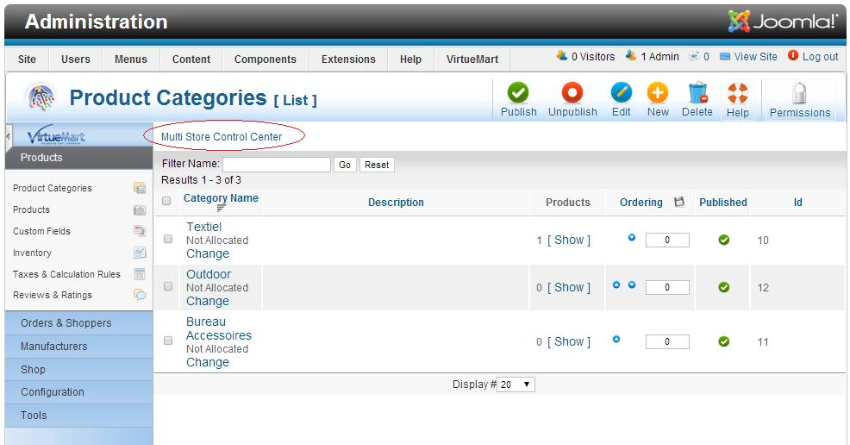
If we remember correctly, This PHP e-commerce platform is not a new entrant in the e-commerce market since it has been around since 2004.
It’s easy to notice that VirtueMart isn’t user-friendly, especially for inexperienced users. To be able to use this open-source eCommerce platform, you are required to have programming knowledge, or at least have a coder or developer who is familiar enough with the Joomla CMS framework and PHP.
It’s also easy to spend an unbelievable amount of money on this site with plug-ins and add-ons. Yet, this could be considered an essential addition if you want more features than the default options they gave you.
10. Spree Commerce.

More than 45,000 retailers refer to Spree Commerce as their choice of an open-source eCommerce platform, not only because it is inexpensive but also because of its visually attractive, contemporary design and robust community.
Pros
- Modular structure.
- Flexible and responsive UI.
- Lightweight setup.
- Huge active community.
Cons
- Customer subscriptions.
- Costly in the long-term.
- Required tech supports.
Our review of Spree Commerce
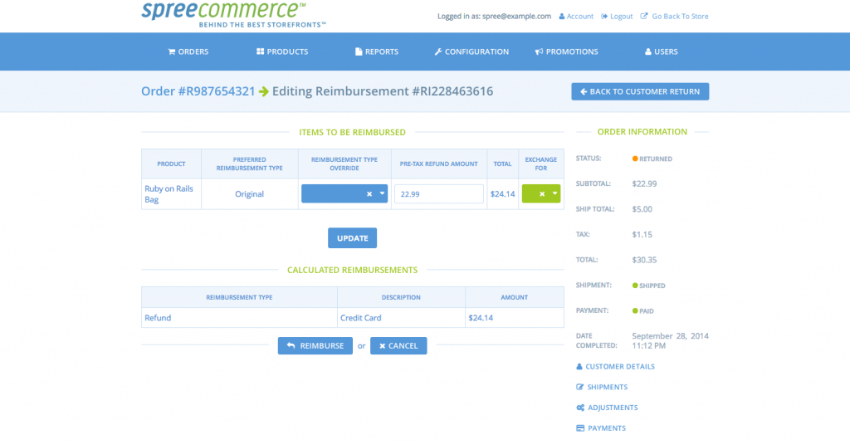
Spree is a fully free-to-download open-source platform. However, it’s to remind you that for several features, hosting, security, and a merchant account, among others, users will have to pay monthly fees.
Compared to most of the open-source eCommerce platforms, Spree Commerce is somewhat technical and may require its users to at least have basic knowledge of programming.
Yet, you can overcome this problem by employing an expert developer to help deploy your websites.
11. osCommerce.

The front end of this open-source eCommerce demo looks a little like a dated Amazon update from the 2000s, which is quite a disappointment in the view of a small store owner.
With a long history of 16 years in development, osCommerce should be stronger than it is right now since it has a loyal community of over 280,000 members, supports about 7,000 available add-ons, and two significant spin-off projects.
Despite all of that, osCommerce only has 13,000 available stores that have been based on this platform. What’s so wrong with this platform?
Pros
- Variety of add-ons.
- Decent features & options.
- User-friendly for newcomers.
- Active forums.
Cons
- Questionable security.
- Require additional care for any updates
Our review of osCommerce
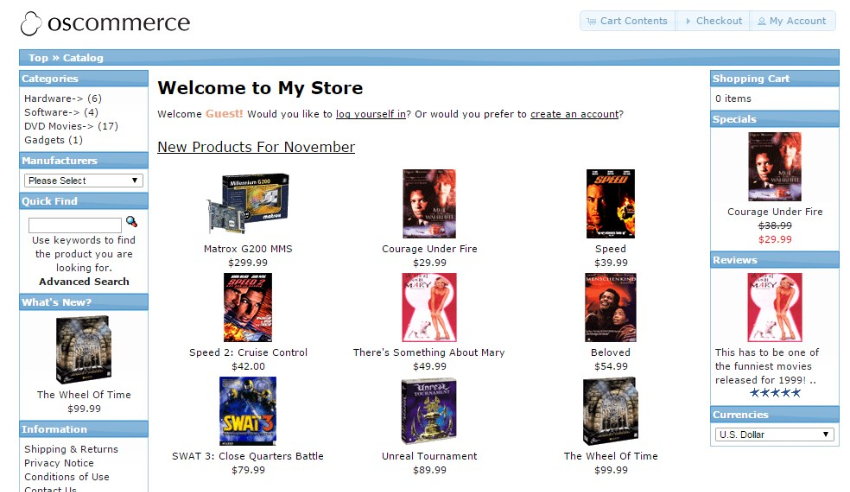
OsCommerce’s main scope is small & mid-level business, Even people with no talent in programming can easily make modifications to their store, which is quite convenient.
The online support via tons of conversations among osCommerce forums is fantastic even though there isn’t any direct support.
Still, further support than other platforms is needed for osCommerce. This means that you need to spend more time updating, keeping the site safe, and working on SEO stuff.
In case you don’t know, there’s a database hack that occurred in 2011, which is an unanswered question in terms of security for this platform.
12. JigoShop.

This precursor to WooCommerce has a narrower range of add-ons than many of its rivals, but it seems that over 500,000 downloads are a large number for any open-source e-commerce platform.
As the second e-commerce platform for WordPress websites, JigoShop offers lots of opportunities for clients to create and optimize their own stores.
Similar to WooCommerce, JigoShop is quite user-friendly to beginners and intermediate levels of businesses.
Pros
- Easy to use.
- Available custom coding.
- Light-weight.
Cons
- Freemium.
- Few add-ons to choose.
- Limited hosting option.
Our review of JigoShop eCommerce platform
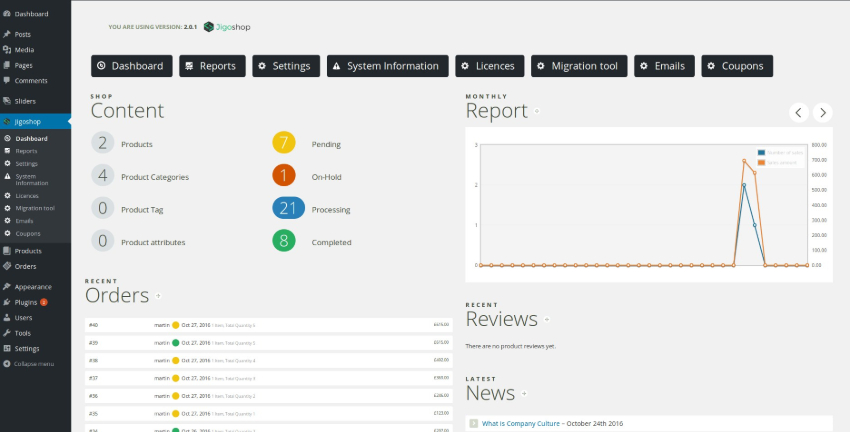
As mentioned above, JigoShop is optimized for newcomers. With only a few clicks, your shop is ready more than ever.
However, JigoShop is a freemium eCommerce platform, which means the source code is there but to get more out of it, you need to pay your monthly subscriptions unless you already get yourself a developer. Not to mention it has only one hosting option.
The initial set of features is not all that plentiful, so some add-ons are required to be added if you want more control over your store.
Unfortunately, there are also no free SEO solutions, so you’d get quite an obstacle to face.
13. X-Cart Ecommerce.

X-Cart is one of the unique open-source freemium platforms for eCommerce. It offers you a lifetime license instead of monthly subscriptions like JigoShop or WooCommerce.
Not only that, but X-Cart also offers possible self-configuration & hosting options with a reasonable paid plan yet no extra transaction fees.
Pros
- Simple to use.
- Convenient custom coding.
- Responsive design & UI.
- Handful features.
Cons
- Lack of add-ons.
- Costly for entry-level.
Our review of X-Cart Ecommerce
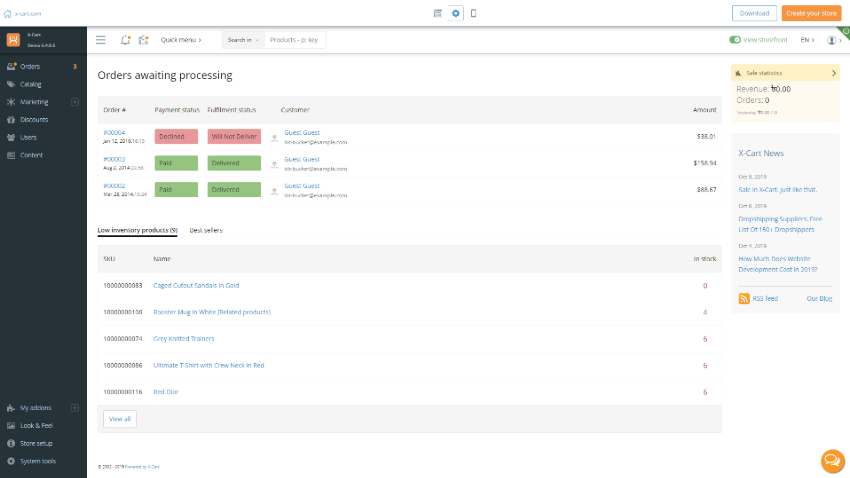
It’s a surprise that X-Cart also provides excellent design and development support to make things easier for the less professional even though their targets are mid-level businesses and enterprises.
The platform can be easily edited to enable more options via basic HTML & CSS with the help of a developer.
The whole paid option is about $500 for a lifetime license, which is a fair price if you decide to build your website on the X-Cart platform.
II. Other Honorable Mention Of Free Open Source ECommerce Platform.
1. Zeuscart.

The first impression I got from their homepage is a decent amount of technical website development terms such as My SQL, GPL, and PHP. It showed the developer-centered nature of Zeuscart.
Either way, Zeuscart is a good open-source eCommerce solution, no matter how much programming expertise you have. Their insistence on the platform’s usability makes the project less daunting than many other options available to open source.
Pros
- Developer-centric.
- Decent supports.
Cons
- Un-friendly interface.
- On-hold project.
- Fewer features.
Our review of Zeuscart
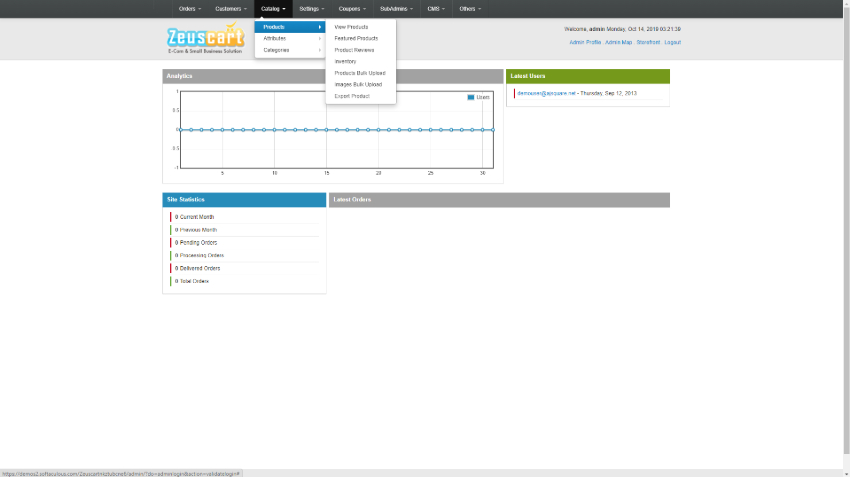
Zeuscart is constructed with Bootstrap and is planned for SMEs. It has a fair amount of useful features, and it was made as a marketing-friendly eCommerce platform.
However, the official website and updates in social media seem to have been discontinued in 2014.
Still, the open-source software can still be downloaded from the Zuescart website if you desire to take a look.
2. RokQuickCart.

RokQuickCart is basically an eCommerce component of the RocketTheme team, which could be considered an entry-level platform for small businesses and online stores. It’s also why we included it in this list.
By connecting it to any of your Joomla websites, with many checkout options ranging from Google Checkout, Paypal, and Amazon, RokQuickCart helps you manage your store in the easiest way possible.
Pros
- Simple interface.
- User-friendly design.
- Lightweight setup.
- Well-designed structures.
Cons
- Fewer customization options.
- Small user base.
Our review of RokQuickCart
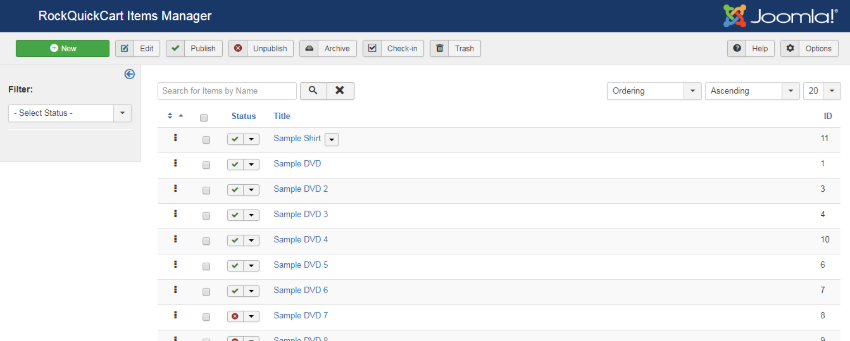
The platform is lightweight on the runtime and will not slow down your websites’ load speed. Administrative options are also intuitive, not to mention its well-designed structures.
Designed for newcomers in terms of eCommerce, RokQuickCart has many basic and simple features for Joomla. Yet, compared to WooCommerce or WordPress, RokQuickCart seems to have fewer options and a much smaller user base.
3. AFCommerce.

It’s to be mentioned that there’s an eCommerce platform with the name of AFCommerce without many people knowing it existed.
This platform is an open-source PHP platform based on My SQL, and it can be run on many operating systems.
AFCommerce is memorable for having a terrible reputation for customer service and support. It’s horrible in terms of SEO customization, and it also doesn’t offer many features like Magento or even CubeCart.
Pros
- Lightweight.
Cons
- Limited customizing options.
- Expensive setup.
- Not SEO friendly.
- Aged coding issues.
- Bad supports.
Our review of AFCommerce
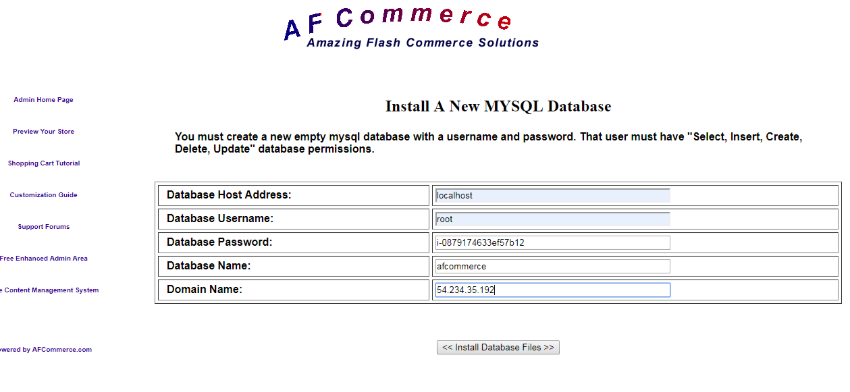
Even though it’s tested on over 250,000 eCommerce websites of standard systems, AFCommerce has been past its prime since the year 2007.
Personally, I wouldn’t recommend you to use this platform, but if you desire the hard way, you should probably prepare a fair amount of budget and at least some website developers for the coding matter you might have to face.
III. New Open Source ECommerce Platform Under Development.
1. TomatoCart.

TomatoCart is a simple and user-friendly eCommerce platform built upon osCommerce 3. It can be personalized entirely via built-in CMS. The platform is quite lightweight compared to others.
Pros
- Lightweight system.
- SEO friendly.
- Lots of features.
- Easy customization.
- Custom-coding support.
Cons
- No extensions just yet.
- Under-development.
Our review of TomatoCart eCommerce platform

This is one of the most potent platforms for eCommerce since its release. What a pity that TomatoCart doesn’t have many extensions since it’s still under development.
Tomato Cart has solved many of the issues facing other systems like flexibility, SEO customization, and content marketing optimization. Its features even include numerous transaction gateways, multiple targeting functionality, and even a complete analytics system for your store.
2. SimpleCart js eCommerce platform.
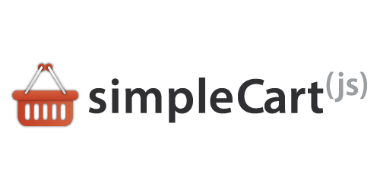
SimpleCart js is a lightweight, fast-loading shopping cart program not to be mistaken with the Premium e-commerce system of the same title. Built with JavaScript and using your existing CSS, it is growing rapidly into a strong eCommerce contender.
Pros
- Developer-centric.
- Based on JavaScript & CSS.
Cons
- Early development stage.
- Limited documentation.
- Require programming knowledge.
- On-hold updates.
Our review of simpleCart js eCommerce platform
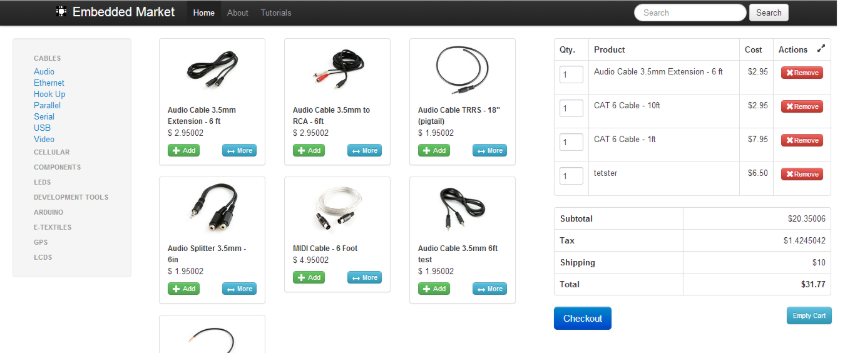
SimpleCart js does not deliver many of the backend functionality you might be searching for because of its lightweight design.
On the simpleCart(js) page you can find the installation instructions and related documentation but keep in mind that since 2010, nothing has changed, and if our speciation is true then the project is currently on hold.
There isn’t any official support, so it’s recommended to solve any problems on your own via forum research and available YouTube tutorials.
3. Shuup eCommerce platform.

Shuup is a new open-sourcee eCommerce platform, which was originally created by web designers from Finland, and it’s still in the development stage, yet we are eager to see what it would become in the next few years.
Pros
- Focused on UX – UI.
- User-friendly design.
Cons
- Early development stage.
- Few security options.
- Limited documentation.
- Based on Python.
Our review of Shuup eCommerce platform
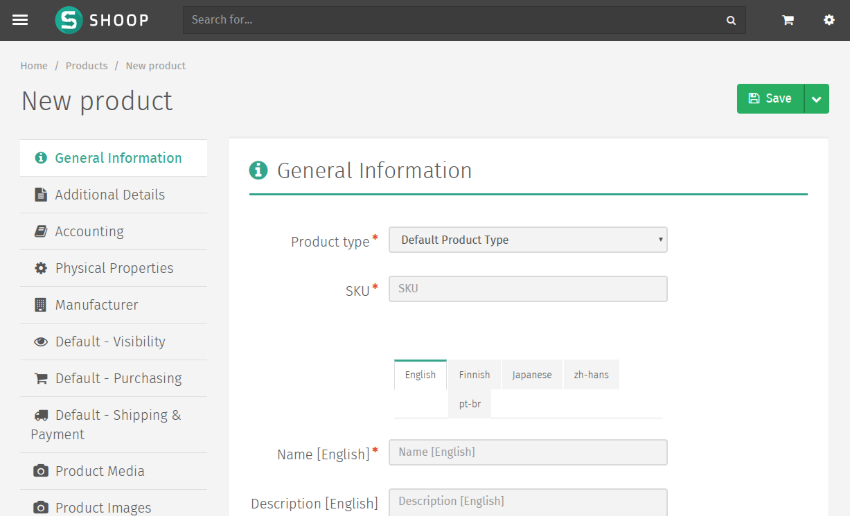
The customization options are decent at best, designed with Django and Python. Don’t be confused by its simplistic design, Shoop could also be custom-coding if needed.
Yet, if you want to take full control of your website, an experienced developer is still required.
It’s to be noticed that Shoop can be used by multiple stores, which is a nice addition to this fresh eCommerce platform.
The checkout system can also be personalized, and among other ways, you can combine payment with Stripe.
4. paGO Commerce.

Pago Commerce is another under-development eCommerce platform that we’re interested in seeing improvement in the next few years.
This platform offers its users a handful of options, including basic features like cross-device responsive settings, a built-in shipping table, a currency converter, social integration, and many more.
Pros
- Responsive design.
- Free “premium” features.
- Modular structures.
- Regularly updates.
- Real-time support.
Cons
- Only available for Joomla websites.
Our review of paGO Commerce eCommerce platform
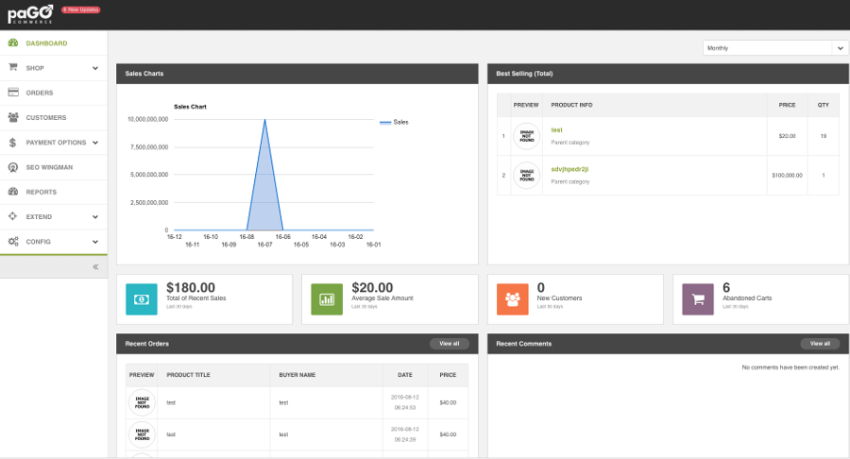
Among many platforms, paGO Commerce is the only one with an eCommerce system built with real-time support in the backend.
We find it amusing that the paGO structure is modular, which means opening up more customizing opportunities if you get a developer by your side.
WHAT IS THE BEST E-COMMERCE PLATFORM?
After reading about all these best open source eCommerce platforms, have you reached your decision on the most suitable for your business?
If you haven’t, then we highly recommend using Magento! It’s one of the most popular eCommerce platforms for all good reasons.
Not to mention, you can have so much support from Magento itself as well as other third-party extension providers to boost your sales.
Take a look at our collections of Magento 2 Extensions here.
BSS Commerce is one of the leading Magento extension providers and web development services in the world. With experienced and certified Magento developers, we commit to bringing high-quality products and services to optimize your business effectively. Furthermore, we offer FREE Installation – FREE 1-year Support and FREE Lifetime Update for every Magento extension.
CONTACT NOW to let us know your problems. We are willing to support you every time.
